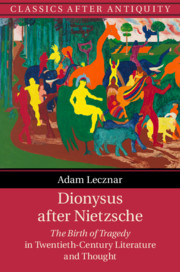Book contents
- Dionysus after Nietzsche
- Classics after Antiquity
- Dionysus after Nietzsche
- Copyright page
- Epigraph
- Contents
- Series Editors’ Preface
- Acknowledgements and Dedication
- Introduction
- Chapter 1 Corybants, Satyrs and Bulls
- Chapter 2 A Great Kick at Misery
- Chapter 3 In Search of an Absent God
- Chapter 4 What Oedipus Knew
- Chapter 5 Dionysus in Yorubaland
- Conclusion
- Bibliography
- Index
Chapter 3 - In Search of an Absent God
Martin Heidegger
Published online by Cambridge University Press: 27 March 2020
- Dionysus after Nietzsche
- Classics after Antiquity
- Dionysus after Nietzsche
- Copyright page
- Epigraph
- Contents
- Series Editors’ Preface
- Acknowledgements and Dedication
- Introduction
- Chapter 1 Corybants, Satyrs and Bulls
- Chapter 2 A Great Kick at Misery
- Chapter 3 In Search of an Absent God
- Chapter 4 What Oedipus Knew
- Chapter 5 Dionysus in Yorubaland
- Conclusion
- Bibliography
- Index
Summary
The focus of this chapter is the German philosopher Martin Heidegger. It focuses on Heidegger’s changing attitude toward Presocratic philosophy in works surrounding his involvement with the National Socialists during the Second World War. It is particularly concerned with the shifting temporalities of Presocratic philosophy in Heidegger’s thinking: from representing a rupturous, revolutionary force in his ‘Rektoratsrede’ of 1933, it becomes a long-lost, cyclical mode of thinking in his 1946 essay ‘The Saying of Anaximander’. The chapter examines the links between Heidegger’s articulations of this particular archaic era of philosophy and a contemporary discourse of responding to the National Socialists by means of the Presocratics both positively, in the work of critics like Antony M. Ludovici, and negatively, in the writings of Georges Bataille. Furthermore, it connects Heidegger’s attitude towards the significance of the Presocratics to Nietzsche’s writings about Greek philosophy both in The Birth of Tragedy and in other works of the same time, such as his unpublished tract Philosophy in the Tragic Age of the Greeks.
- Type
- Chapter
- Information
- Dionysus after Nietzsche<I>The Birth of Tragedy</I> in Twentieth-Century Literature and Thought, pp. 99 - 129Publisher: Cambridge University PressPrint publication year: 2020



